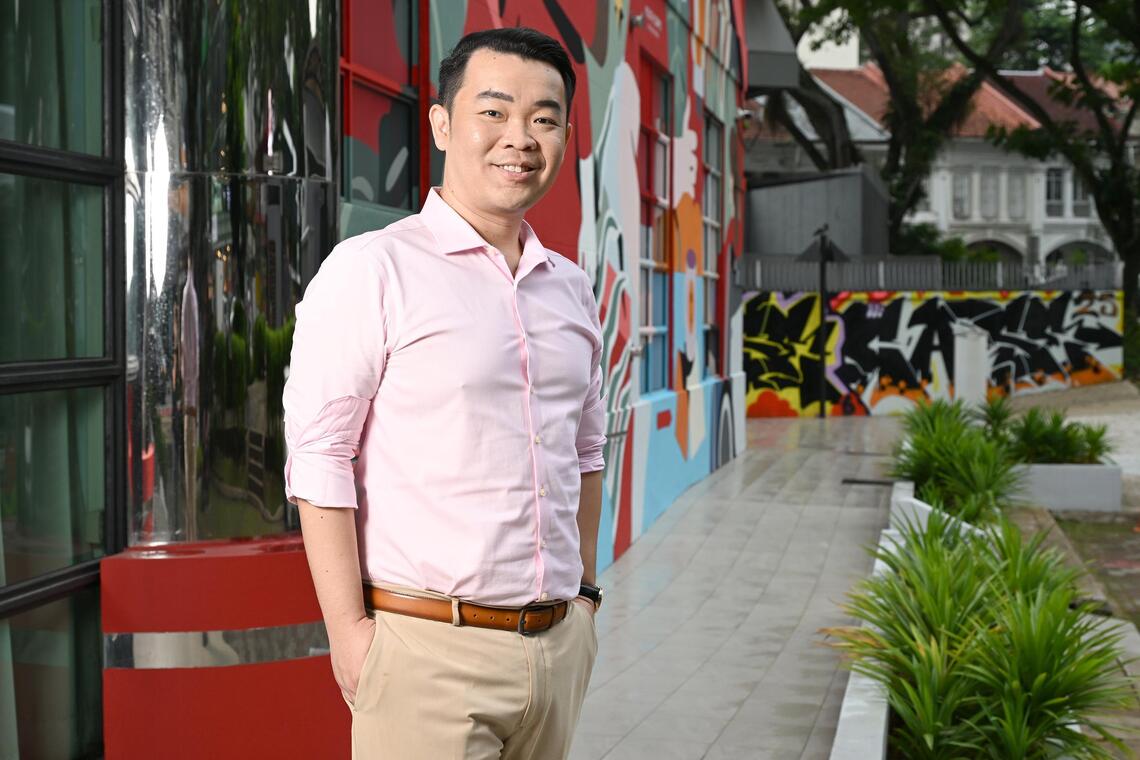That pulsating, interconnected nebula of light and shadow within all of us, known commonly as the brain, is the powerhouse of human functioning. But, sometimes, at times without an immediate trigger, the shadows begin to overwhelm. And when it does, it knocks not only its victims but also those around them.
Mental health champion Cho Ming Xiu was an 18-year-old student at a junior college (JC) when a close friend abruptly dropped out of school. Some time later, a lecturer revealed he had been diagnosed with depression.
It left Mr Cho baffled and concerned about his friend.
“At that time we didn’t know what depression was,” Mr Cho, now 38, told The Sunday Times. “And we didn’t know that, wow, depression can actually cause such a huge impact on a young person’s life.”
When he went with friends to see his buddy, Mr Cho was perturbed.
“His physical appearance had drastically changed. He looked haggard, and he hadn’t been eating and sleeping well because of his condition. He was very down at that point. He didn’t want to talk.
“We just hung around. We would just be there… giving him company. It was over months. Then slowly, because he loved basketball, we engaged him whenever we visited him. After a few months, he became better,” Mr Cho said.
That episode became a turning point. He didn’t know then that it would lead him to establish Campus PSY years later, in 2016, with the acronym PSY standing for Peer Support for Youths.
The non-profit entity is now a leading organisation working to promote mental health awareness and peer support among young people in schools and workplaces.
Through advocacy, training, support, volunteering and intervention, Campus PSY wants all young people to be there for their peers in their difficult moments. And, with their work, it hopes those dealing with mental health issues know that someone is there for them.
Mr Gasper Tan, chief executive officer of Samaritans of Singapore (SOS), told ST: “Campus PSY has been instrumental in giving young people both a voice and a platform to lead mental health conversations.
“It focuses on empowering young people and helping them to develop resilience, and by equipping them with skills and confidence, it has built a peer network that helps to reduce stigma (on the issue) among young people and encourages them to seek early help and foster a sense of community support.
“This allows the young to be active agents of change rather than just beneficiaries of programmes.”
Mr Cho hopes that through his work, he can shift the mindset and culture of Singaporeans on mental health, from stigma to empathy and proactive support. He believes that often “simply being there with a non-judgmental listening ear with a young person is enough to change lives”.
“We aspire to cover the whole spectrum from low-risk all the way to high-risk cases,” he said.
To meet the needs of “youth who might be in distress”, Campus PSY equips its ambassadors with mental health literacy and peer-helping skills over a weekly six-module training course. During this phase, they learn basic “peer support” skills, including active listening, expressing empathy, asking relevant questions and implementing suicide prevention protocols.
The ambassadors then take what they learnt to secondary schools and institutes of higher learning to build communities through awareness talks and outreach workshops. These are now held at companies and workplaces as well.
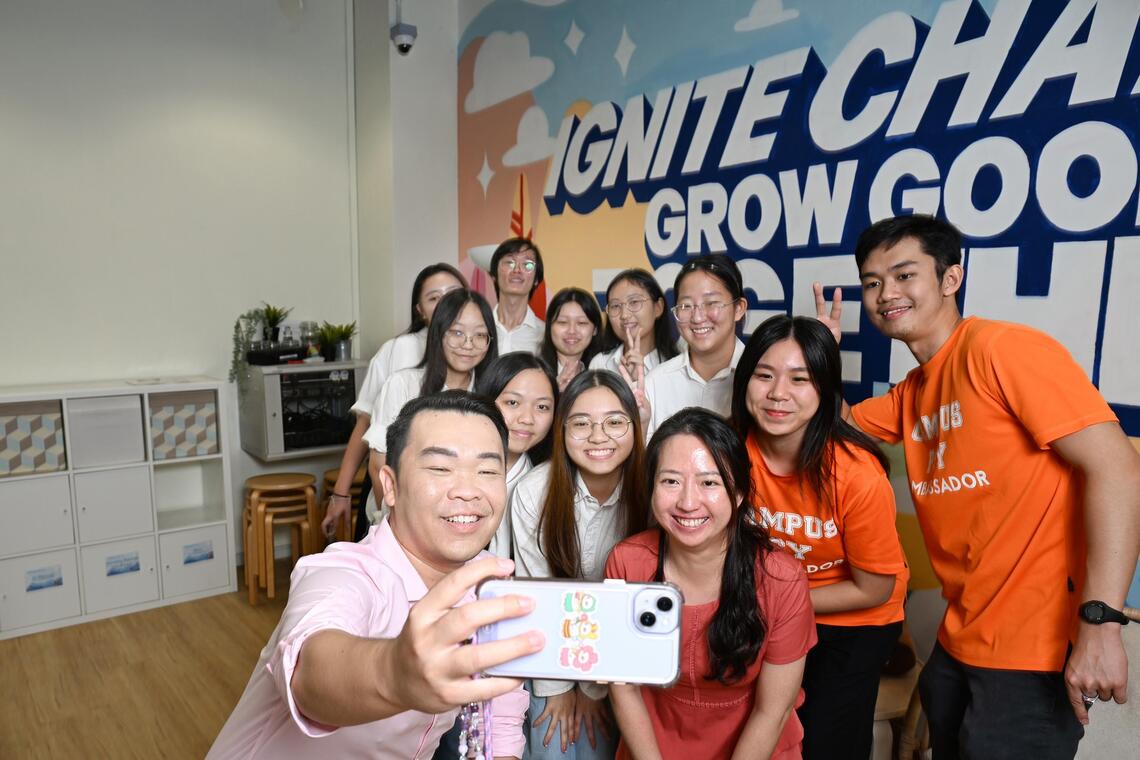
Mr Cho Ming Xiu taking a wefie with Ngee Ann Polytechnic students and Campus PSY ambassador peer supporters at The Red Box in Somerset Road.
ST PHOTO: DESMOND WEE
Over time, Campus PSY has also partnered government and social service agencies, as well as corporates, to enable policy discourse.
“We want to bring up some of the concerns on the ground among our young people on mental health issues to the policymakers and create certain changes downstream,” Mr Cho said.
During the Covid-19 period, the need for work in this space increased due to the circumstances, leading to the formation of the Youth Mental Wellbeing Network by the Government in 2020. This evolved into the SG Mental Well-being Network in 2022. Mr Cho was invited to be part of the steering committee in both networks.
A year later, the Government announced the National Mental Health and Well-Being Strategy. It signalled a recognition by the authorities that mental health has become a significant health and social issue.
The strategy’s key thrust is to tackle the issue coherently and holistically, from both preventive and curative perspectives, through the community, schools and workplaces, a report in this paper said.
Each year, Campus PSY’s efforts reach about 350 young people, and since its founding, it has served more than 3,000 of them.
It has trained over 500 peer supporters, co-organised and participated in 120 outreach events, collaborated with 90 agencies from the public sector, social service, youth, healthcare and education sectors, as well as grassroots organisations on various initiatives to reach as many young people as possible.
Its workforce? Mr Cho has 15 Campus PSY ambassadors working with him and nearly 300 volunteers.
Among them is marketing and communications professional Jael Ng, 34, who started volunteering with Campus PSY about a year ago after a corporate mental health event.
Volunteering with Campus PSY has helped her get over her feeling of helplessness – to some extent – when she couldn’t help a friend who had lost his sister in a tragic episode and was reluctant to talk about his depression out of fear it may affect his corporate career. “It’s good that such discussions are now happening,” she said.
Spending time with young people has made her value the meaningful engagements she has while volunteering, which also gives her a sense of personal fulfilment and purpose in her work.
“I came to realise the value in being true to myself,” she told ST. “It helped me as a person to be rooted.
“It made me ask myself how I can bring this realisation of showing up as who I am back to the environment that I spend a lot of time in, back to the initiative that I’m trying to advocate and drive,” said Ms Ng, who has considered a career switch to social service but is not ready to take the leap yet.
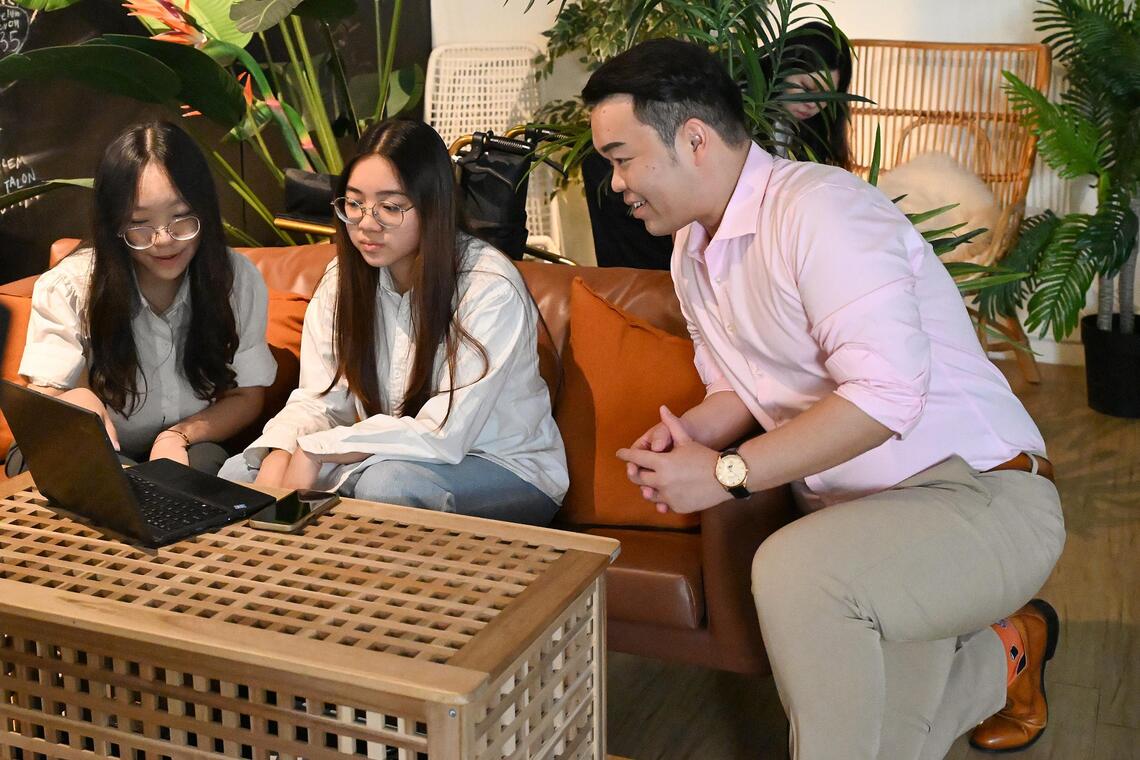
Mr Cho with volunteers Zhang Ruyi (left) and Tan Zi Yi. Campus PSY’s efforts reach about 350 young people every year, and since its founding, it has served more than 3,000 of them.
ST PHOTO: DESMOND WEE
For Mr Cho, the road is long and he feels he has covered only part of it.
“We wanted to equip every young person in Singapore with basic mental literacy and support skills so that they can be there for their family members and others struggling with mental health conditions,” he said.
“We hope that we can do more in the next 10 years. We are coming into the ninth year now and we are very thankful for the traction gained. But we still have a lot to do.”
Coming this far has not been easy. “There were times I asked myself: Is this really possible? But then I’d see a young person, 17, 18 years old, step up to help a friend in distress. And I’d be reminded why we began.”
Campus PSY ambassador Vidal Low, 20, believes the work they are doing counts for a lot. Having been depressed himself when he moved to secondary school after being a “high-flier” in primary school and realising that he couldn’t compete with others better than him, he credits professional intervention for saving his life.
“Belief in oneself is most important,” he said.
“For intervention to be effective, ground-up support – from family, friends, school and peers – plays a vital role in building self-confidence,” said Mr Low, noting that Campus PSY is playing a significant role in this aspect.

Mr Cho (centre) and Campus PSY ambassador Vidal Low (left) in a discussion.
ST PHOTO: DESMOND WEE
Mr Tan of SOS credits peer support for building a strong safety net for the community to ensure people don’t fall through the cracks. “No one organisation can do that, but it is important that Campus PSY and other groups continue working in this space.”
Ms Deladine Tan, 21, feels fulfilled after joining Campus PSY as an ambassador out of curiosity a few months ago. She feels she is doing something meaningful as she engages with her peers.
But the work is challenging, and one key principle Mr Cho emphasises is the importance of self-care.
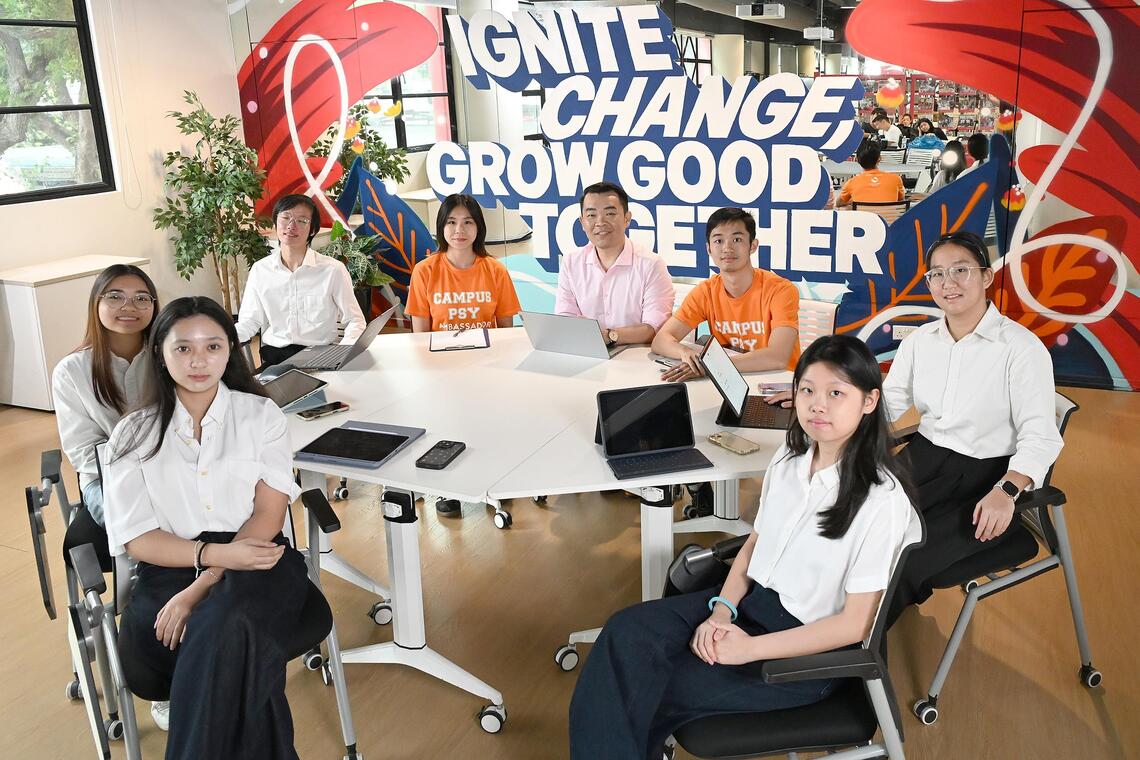
Campus PSY ambassadors Vidal Low (third from right) and Deladine Tan (fourth from left) joining Mr Cho (fourth from right) in a meeting at The Red Box in Somerset Road.
ST PHOTO: DESMOND WEE
Caregivers can get impacted too, he said, recalling an episode when a peer supporter thought she had recovered from her mental health condition and was well when she joined Campus PSY.
But her engagement with an individual triggered disturbing thoughts of her own past, and ensuring her well-being became challenging. “We encouraged her to focus on her own treatment and take a sabbatical,” Mr Cho said.
“Self-care is very important, especially for mental health professionals, because if you can’t take care of yourself, you can’t take care of others,” said Mr Cho, noting it can be tough because of the long hours involved in this line of work.
“Some cases are high risk and require a lot of attention. It can be draining emotionally,” added Mr Cho, who relies on his faith, fitness, reading and friends for his self-care.
How about entertainment? “My work is my life,” he said while mentioning his interest in K-drama, but he couldn’t recall any he had watched recently.
The son of a civil servant, Mr Cho did not expect this would turn out to be his career.
“The episode with my friend happened around 2005. Back then, we didn’t know what was peer support. Now we all know what it is – it’s social emotional support,” he said.
“The support you get from those close to you and loved ones, family and friends, counts for a lot.”
Over the next few years, the thought stayed in his mind as he tried figuring out his career choices.
“There was the conventional track. Go to JC, then NS (national service), get into a local university under a scholarship and then civil service,” he said. But his volunteering work experiences seemed to be pointing him elsewhere.
Mr Cho had an opportunity to volunteer as a tutor and mentor to young probationers from dysfunctional families and backgrounds. Seeing them get into their desired courses eventually at the Institute of Technical Education “was a very fulfilling experience”, he said.
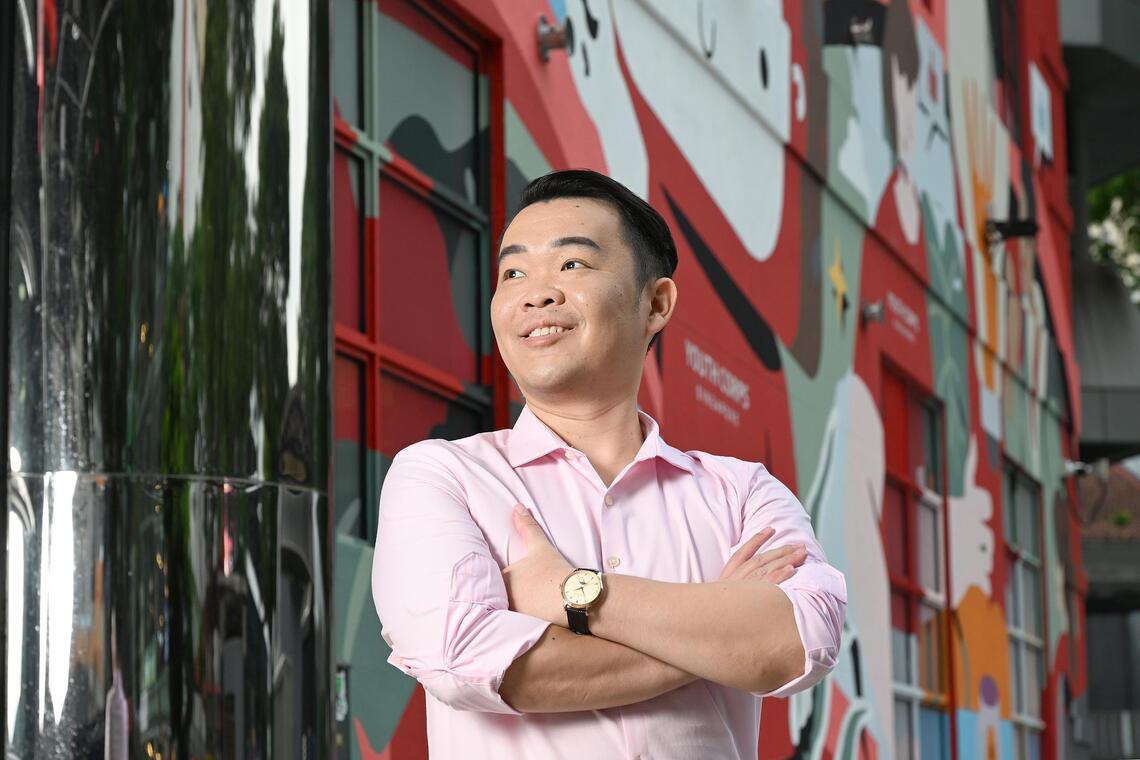
Mr Cho said it was a fulfilling experience seeing young probationers from dysfunctional families getting into their desired courses.
PHOTO: DESMOND WEE
Next, he volunteered at the Institute of Mental Health, serving the elderly schizophrenic patients who had been abandoned by their families because of the difficulties in taking care of them.
“When we engaged them, it felt like we were their children or their grandchildren. And seeing what impact it was having gave us a feeling that we – all volunteers – really treasured,” he said.
In 2016, over conversations, he found like-minded friends, supporters and volunteers wanting to do more to help their loved ones and others suffering from mental health issues.
“We wanted to create a youth movement to provide basic emotional support for every young person aged 15 to 35,” he said.
Mr Cho pitched his idea to Youth Corps Singapore, which is part of the National Youth Council, and it offered venue support for Campus PSY’s soft launch at the Red Box building.
He also received support from other agencies – among them SOS and Singapore Association for Mental Health.
That same year, Campus PSY was born.
“I didn’t think I would pursue this as a career but, just as Steve Jobs said, the dots just connected,” Mr Cho said.
Mr Jobs, who co-founded Apple Inc, referred to connecting the dots during his 2005 Stanford commencement speech to encourage students to trust their intuition and past experiences to guide them in their endeavours, noting that the meaning of events would become clear only with time. “You can’t connect the dots looking forward; you can only connect them looking backwards,” he said.
Mr Cho encourages those aspiring to pursue their ambitions to be bold and courageous. “If you have the faith to do something, and you have the conviction to do it, and you know why you are doing it, then go for it.”
“Never feel that you’re too insignificant. There is this verse that says a mustard seed can move mountains.”
And what happened to his school friend? Did he go back to school?
“No, he didn’t go back to school. But he subsequently enlisted in NS and continued with his studies, and I heard he’s doing okay now, yeah.”
National helpline: 1771 (24 hours) / 6669-1771 (via WhatsApp)
Samaritans of Singapore: 1-767 (24 hours) / 9151-1767 (24 hours CareText via WhatsApp)
Singapore Association for Mental Health: 1800-283-7019
Silver Ribbon Singapore: 6386-1928
Chat, Centre of Excellence for Youth Mental Health: 6493-6500/1
Women’s Helpline (Aware): 1800-777-5555 (weekdays, 10am to 6pm)
The Seniors Helpline: 1800-555-5555 (weekdays, 9am to 5pm)
Touchline (Counselling): 1800-377-2252
Touch Care Line (for caregivers): 6804-6555
Counselling and Care Centre: 6536-6366
We Care Community Services: 3165-8017
Shan You Counselling Centre: 6741-9293
Clarity Singapore: 6757-7990

Elevated insights from seasoned perspectives. Crafted by journalists. Powered by Purpose: The Straits Times Signature Series is a new editorial project helmed by experienced journalists to shine a light on people, themes and ideas that rarely get the attention they deserve in everyday news cycles.
Shefali Rekhi is a senior editor & writer working on special projects. She joined The Straits Times in 2000 and has helmed two Asia-focused projects, efforts to grow the paper’s international reach and fight fake news. She writes on a range of issues.

